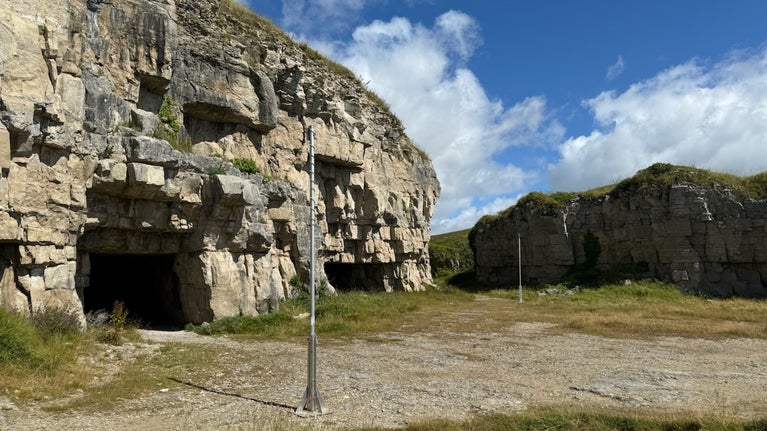National Trust sounds out speed dating for bats!
- Published:
- 04 September 2024

In late summer and autumn, hundreds of bats gather along the coastal cliffs in Purbeck. Winspit Quarry is a nationally-important ‘swarming’ site for bats, and this year the National Trust is using the combined forces of technology and dedicated volunteers to find out more about this after-dark activity.
Purbeck is home to 15 of the 17 UK species of breeding bat. Not all bat species swarm, but those that do fly from far and wide to a specific area to mate and select hibernation sites.
Working closely with the Dorset Bat Group, the Trust has mounted bat detectors on three poles in Winspit Quarry. These have sensors to pick up the ultrasonic clicks, squeaks and calls of the bats, which are largely at frequencies higher than humans can hear. The audio will then be stored on memory cards, ready for analysis later in the year.
National Trust ecologist, Michelle Brown, said:
“Most of the bat activity is under cover of darkness, so it’s difficult to know how many bats are using the caves, and what species they are. The detectors will help us learn more, giving a broad picture of the range of species that pass by. It isn’t an exact science as some species have sounds that are too similar to distinguish them from each other, but it will give more information than we’ve been able to gather before.”

The detectors will back up the monitoring that volunteers from the Dorset Bat Group have been doing for the past 12 years. Working under licence, they trap bats in nets, measure them and record their size, weight and sex. They are then ringed on their forearms – previous tags have shown that some bats come to Winspit from as far away as 27 kilometres.
Michelle said: “We are hugely grateful to the bat group for all their hard work, which often involves being out on the windswept coastline in the cold and dark! We simply couldn’t do our work without the support of volunteers across Purbeck who help out with all aspects of wildlife monitoring and countryside management.”
Michelle also added a note of caution for anyone hoping to see a mass of bats.
“Autumn swarming is the term used to describe bats that gather at key locations to mate. We have different species swarming at different times, and the activity takes place in waves between dusk and about 4am. So there’s not a ‘swarm’ as such to see. Winspit Quarry is closed to the public for safety reasons, so we’d ask that people don’t go down there, especially at night.”
Bat studies and other initiatives are also taking place at inland quarries across South Purbeck. The aim is to put all the findings together then devise a strategy for bats across the region. This would involve connecting landscapes where they can spread and thrive, managing the land to increase insect numbers to feed the bats, improving existing roosting sites and creating new roosts.
The detectors will be in place until November then the British Trust for Ornithology (BTO) will help analyse the results using specialist technology.
